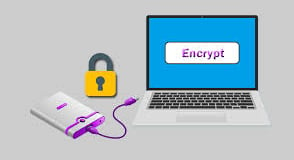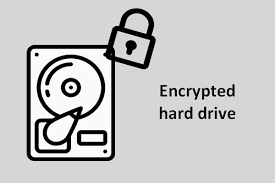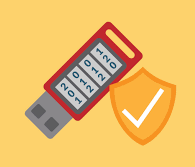Introduction
Picture this: an employee’s laptop is lost or stolen. It contains sensitive business data—HR records, client information, financial details. Without encryption, it’s open season for anyone who finds the laptop. But with encryption, that data is unreadable to anyone without the decryption key. In this blog, we’ll break down why encrypting hard drives is a must-have practice in any security strategy and how it plays a crucial role in protecting your organization’s data.
Abstract
Overview
Encrypting hard drives is the process of converting data into a format that is unreadable without the proper decryption key. It’s like locking your sensitive data in a vault, where only authorized individuals can access it. If a device is lost or stolen, encrypted data remains secure, ensuring the confidentiality of your business’s critical information.
In today’s cybersecurity landscape, safeguarding sensitive data is a top priority. One of the simplest yet most effective ways to protect against data breaches is through encryption. By encrypting hard drives, even if a device is lost or stolen, your data remains secure. In this blog, we’ll explore the importance of encrypting hard drives and how SecureKnots can help ensure your data stays safe through comprehensive security measures and expert guidance.


[Disclaimer: This blog post is for informational purposes only and should not be construed as legal or financial advice. Organizations should consult with legal counsel and regulatory authorities to ensure compliance with reporting requirements.]
Mandatory
In the age of remote work and BYOD (Bring Your Own Device), encrypting hard drives has become a mandatory security practice. Many regulatory frameworks require businesses to protect sensitive data, making encryption an essential component of compliance.
Applicability
Encryption applies to all devices that store sensitive data—laptops, desktops, external hard drives, and even mobile devices. If your organization handles personally identifiable information (PII) or confidential client data, encryption is crucial.
Regulatory or Company Interest?
Encryption is often mandated by regulatory standards such as GDPR, HIPAA, and PCI-DSS. Failing to implement encryption can result in hefty fines and loss of reputation, making it a top priority for any organization concerned with data security.
Key Guidelines
Always encrypt devices that store sensitive data.
Use strong encryption algorithms to ensure data protection.
Manage decryption keys securely and limit access.
Implement automatic encryption for all company devices.


Key Implications
If hard drives aren’t encrypted, sensitive data is at risk. In the event of theft or loss, unencrypted data can easily be accessed, leading to data breaches, financial loss, and reputational damage. Encrypting your devices is a simple yet powerful way to mitigate these risks.
Countries with Adoption or Influence
Countries like the United States, the EU, and Australia have been at the forefront of enforcing encryption standards, with strict data protection regulations driving global adoption.
International Frameworks Influenced
International frameworks such as NIST, ISO/IEC 27001, and GDPR emphasize the need for encryption to protect sensitive data, driving organizations worldwide to adopt strong encryption measures.
Regional and Industry-Specific Frameworks
In industries like healthcare (HIPAA) and finance (PCI-DSS), encryption is often a mandatory requirement. Organizations must implement encryption protocols to ensure compliance with these sector-specific regulations.
Secure Your Digital Identity with SecureKnots
Contact us to learn more about our cybersecurity services and ensure your organization meets cybersecurity requirements.


Conclusion
Encrypting hard drives is a critical step in securing sensitive data and mitigating the risks associated with device theft or loss. In today’s fast-paced digital world, where data breaches are increasingly common, encryption acts as an essential line of defense. By ensuring that all devices storing sensitive information are properly encrypted, organizations can safeguard their data and maintain compliance with regulatory standards. At SecureKnots, we specialize in providing tailored cybersecurity solutions, including VAPT, security awareness training, and ransomware simulations, to help you implement and maintain strong encryption practices. With our expertise, you can rest assured that your organization's data is protected,even in the event of a breach.
How SecureKnots Can Help
At SecureKnots, we help organizations implement robust encryption strategies as part of our GRC consulting and security testing services. Our Vulnerability Assessments & Penetration Testing (VAPT) can identify encryption gaps, while our Security Awareness Training ensures that employees understand the importance of encryption. With our ransomware and phishing simulations, we also prepare your team to handle potential data breaches. SecureKnots is here to help you safeguard your sensitive data with the right encryption practices and compliance guidance.
Thank you for your attention! If you have any inquiries about cybersecurity requirements or need expert guidance, please don't hesitate to contact SecureKnots.
This should wrap up the blog and fulfill the promise made in the previous one!
Encrypt Hard Drives
If someone were to steal an employee’s laptop, what would happen to the sensitive information stored on it? Without proper protection, it could be accessed and misused. Encrypting hard drives turns the data into a secret code, making it unreadable to anyone who doesn’t have the correct decryption key. Even if a device is lost or stolen, your data remains safe
WITH OUR SHORT BLOGS
STAY UP TO DATE
Copy Rights @ 2023 SecureKnots. All Rights Reserved.
CONTACT US
Contact@Secureknots.com
USA
+1-302-601-2346
+1-302-608-6708
INDIA
080-31658865
GET IN TOUCH
